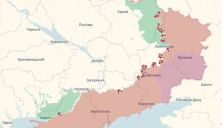In 2020, a political crisis arose in Belarus related to falsified elections. At that time, the Belarusian society, which expected certain political changes for the better in connection with the elections, the restoration of some democratic norms, was ready for protests. However, the attempt to change anything in the country failed and total repression began. Political scientist Volodymyr Fesenko said this today, August 10, on the air of FREEDOM TV channel.
He noted that some signs of the totalitarian regime of Oleksandr Lukashenka were present even before the crisis of 2020.
“In 2020, there was a bit more competition, and the opposition was more ready to fight, even though the main opposition candidate, the husband of Svitlana Tykhanovskaya, was arrested and imprisoned. However, the Belarusian opposition at that time was able to at least relatively unite and start the fight for democracy. However, this attempt turned out to be a failure, in particular due to Russian intervention: at that time, the Putin regime actively helped Lukashenka, in particular with its special forces and the work of special services. After this crisis in 2020, mass repressions began in Belarus,” Fesenko said.
The political scientist reported that a significant part of the Belarusian opposition simply left at the risk of going to prison.
“I think tens of thousands of people left, if not more. And before that there was a large political emigration. But in 2020, I think there was a new, perhaps one of the biggest peaks of political emigration from Belarus. As far as I know, I have talked with representatives of the Belarusian opposition in recent months, and the repression has intensified. In fact, even those people who not only went to protests, but also somehow showed themselves actively, who, for example, put signatures in favor of opposition candidates, even somehow lit up in support of the opposition candidate, are now under control. Everyone ended up under the cap. But the level of repression has increased even compared to what it was before 2020. This is the main explanation for why there are no new protests,” he explained.
Fesenko drew attention to the fact that the active part of the opposition has left Belarus and cannot organize protests.
“There were attempts to exert informational influence through YouTube channels and Telegram channels, but Lukashenko started an information purge. The most important thing, of course, is total repression. This is probably the main tool that helped Lukashenka preserve his regime and which, unfortunately, is still working. There was no split of the elites. I think one of the reasons why it was not possible in Belarus, unlike in Ukraine, was that the elites did not split, they remained loyal to Lukashenka,” the political scientist noted.
He clarified that by elites he means the administrative apparatus, because there are no political elites as such in Belarus.
“I think that, despite the repression, there are still hopes for changes in Belarus. At least abroad — in Ukraine, in Poland — the backbone of the political opposition has survived. And the war in which Lukashenko got involved together with Russia, becoming an accomplice of Putin’s war crimes, like the sword of Damocles hangs over Lukashenko’s regime in the event that Putin’s regime loses the current war against Ukraine. I think that Lukashenko may lose even earlier,” Fesenko expressed his opinion.
The political scientist noted that, unlike Russians, the majority of Belarusians oppose the war in Ukraine.
“They even say that the army of Belarus does not want to fight. This is also very important. That is, after all, the Belarusian society is tired of Lukashenka, of his adventures, but people lack determination, maybe they lack impetus, therefore, if there is an external push, then there will be changes,” he stated.














